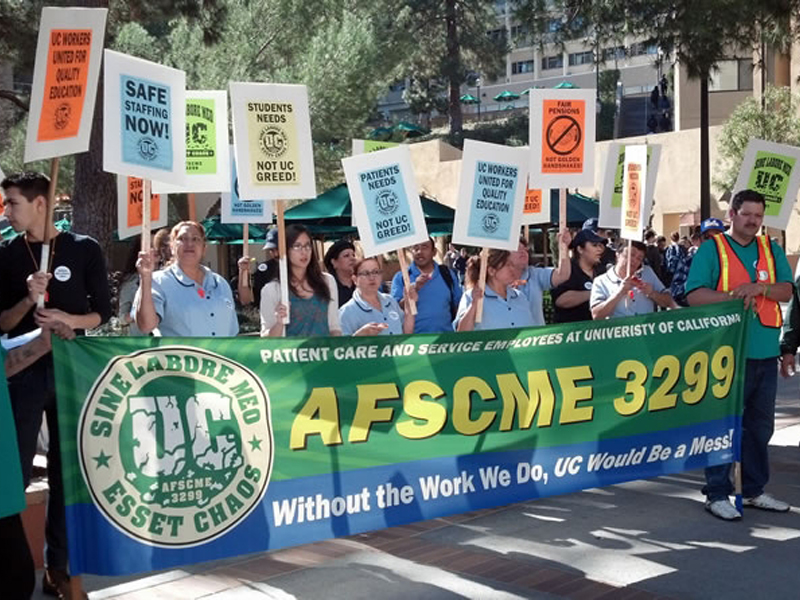
Issuing a notice to the UC Office of the President (UCOP), the American Federation of State, County and Municipal Employees Union (AFSCME) is planning to strike on May 21 and 22 to protest against reduced pensions and poor working conditions.
UCOP considers the union’s threat of withholding medical service during the two-day strike as “grossly inappropriate,” since it would substantially endanger health care patients. In response, the UC is therefore pursuing a restraining order on the premise that any strike that poses a threat to public health or safety is illegal according to California state law.
The union, which represents 12,900 workers across five UC medical centers and nine student health centers, received an overwhelming majority approval rate of 97 percent to pursue the two-day strike. The patient technical workers voiced concerns of chronic understaffing, skyrocketing management payroll and exorbitant seven-figure pensions for top executives.
Earlier this year, the union released a 31-page whistleblower investigation report, “A Question of Priorities,” revealing the dwindling patient care quality in conjunction with subsidizing excessive management costs and rising debt service payments. In the report, AFSCME accuses the UC of placing profit before patient care, jeopardizing not only its reputation as a premier, world-class facility, but also the well-being of its workers.
Many medical care workers have reported feeling sorely burnt-out by the understaffing situation, while many more have expressed concerns that the pace of services does not prioritize patients and the underinvestment in medical equipment risks compromising patient care.
Regarding the problem of short-staffing, Todd Perez, a UCLA senior emergency medical technician stated, “Sometimes, you’ve already been driving all day and there are bad weather conditions … when you’re short-staffed, it’s much more tiring to be on the road. It’s not safe for us, for other drivers on the road or for the patients. You’re risking an accident.”
In addition, Perez claims that hospital short-staffing can cause each worker to be unnecessarily and unconditionally indispensable during work hours. He explains that if even one person is absent due to illness or injury, the ambulance team may reach the end of a twelve-hour shift without finding anyone to relieve them.
Moreover, from 2009 to 2013, UC expanded management positions by 38 percent, adding $100 million to the annual payroll. However, “Hiring more and more managers does not translate into greater productivity,” says the report. While the administrators’ salaries and management positions are continuously inflating, front-line patient care workers’ salaries and retirement benefits are shrinking.
AFSCME believes it is the right and duty of the workers to demand for fair-worker treatments, thereby increasing the overall quality of the service. AFSCME demands more state oversight and an audit of UC staffing, management and financial practices before more taxpayer dollars are committed to the UC Health system.
Although the UC has been in negotiation with AFSCME since June of 2012, negotiations have reached a stalemate.
As part of the negotiations, the UC offered a competitive four-year contract for patient care employees that includes up to 3.5 percent wage increases per year for four years, health care benefits now and upon retirement, better working conditions and a safe work environment. Nevertheless, AFSCME leaders refused to come to terms with UC’s negotiation proposal, insisting that the UC should accept their demands in full with no alternatives.
“UC will continue to be open to compromise and do what it can on its side of the negotiating table to reach a fair and financially responsible contract for employees. But UC cannot do it alone. AFSCME leaders must engage in a substantive way,” reads a UC report entitled, “Facts about UC-AFSCME Patient Care Technical Negotiations.”
“By encouraging a possible strike among our patient care employees, AFSCME is attempting to use patient care as a tool in contract negotiations … Patients are not bargaining chips,” continued the report.
UC Riverside is likely to escape the campus-wide worker strike, said Kris Lovekin, UCR’s Director of Media Relations. “The school has made adequate provisions and pre-arrangements with the local clinics to help out at University’s Student Health Center during the two-days strike in case of worker shortage,” said Lovekin. “UC Riverside will be least affected by the strike among the 10 campuses, so UCR students ought not to worry.”








